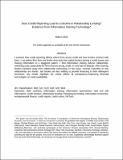Does credit reporting lead to a decline in relationship lending? Evidence from information sharing technology
Author(s)
Sutherland, Andrew Gordon
DownloadAccepted version (548.4Kb)
Terms of use
Metadata
Show full item recordAbstract
I examine how credit reporting affects where firms access credit and how lenders contract with them. I use within firm-time and lender-time tests that exploit lenders joining a credit bureau and sharing information in a staggered pattern. I find information sharing reduces relationship-switching costs, particularly for firms that are young, small, or have had no defaults. After sharing, lenders transition away from relationship contracting, in two ways: contract maturities in new relationships are shorter, and lenders are less willing to provide financing to their delinquent borrowers. My results highlight the mixed effects of transparency-improving financial technologies on credit availability. Keywords: Debt contracts; Information sharing; Information asymmetries; Hard and soft information; Credit bureaus; Relationship lending; Transactional lending; Information economics; Entrepreneurial finance; Credit reports; Credit scores; FinTech
Date issued
2018-08Department
Sloan School of ManagementJournal
Journal of Accounting and Economics
Publisher
Elsevier BV
Citation
Sutherland, Andrew et al. "Does credit reporting lead to a decline in relationship lending? Evidence from information sharing technology." Journal of Accounting and Economics 66, 1 (August 2018): 123-141 © 2018 Elsevier
Version: Author's final manuscript
ISSN
0165-4101